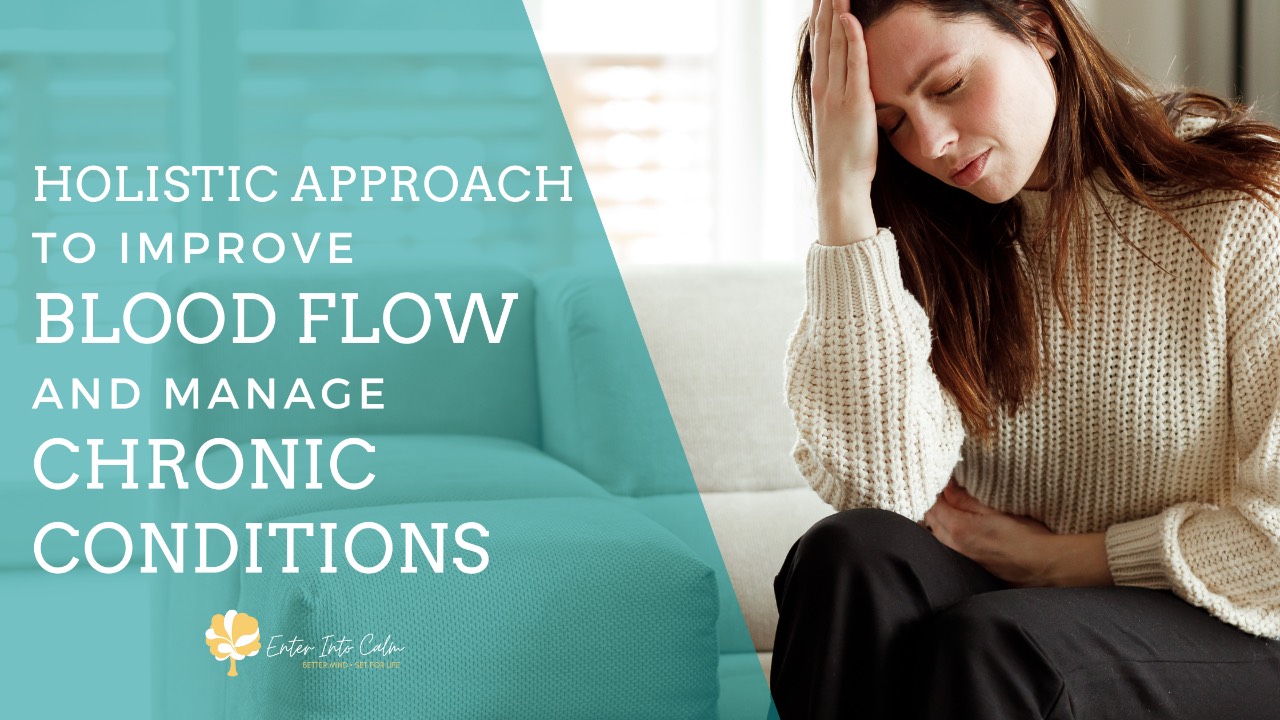A Holistic Approach to Improve Blood Flow and Manage Chronic Conditions
May 03, 2025
At Calm Collective Care, we believe in harnessing the full potential of the mind to foster holistic healing. Our team of experienced practitioners, many with years of nursing expertise, combines hypnosis with coaching and mindfulness tools to support individuals on their journey to well-being. One of the most remarkable aspects of hypnosis is its ability to influence blood flow and vascular health, offering relief for conditions that involve poor circulation, stress, and pain. And the best part? These transformative sessions can be offered over Zoom, making it easier to access healing from the comfort of home.
How Hypnosis Can Help Improve Blood Flow and Manage Chronic Conditions
Hypnosis is not just about relaxation: it is a powerful tool that can modulate your body’s responses to pain, stress, and inflammation, leading to improved circulation and overall health. Whether you are dealing with chronic pain, stress-related conditions, or vascular diseases, hypnosis can be an adjunctive therapy to help manage and reduce symptoms.

Here is how hypnosis can help various health conditions:
1. Sickle Cell Disease (SCD)
For individuals with sickle cell disease, managing the frequent vaso-occlusive crises and associated pain is a constant challenge. Research has shown that hypnosis can attenuate harmful microvascular responses to pain and stress, potentially reducing the frequency of these painful episodes. By helping the body relax and improve circulation, hypnosis is a valuable tool for pain management and disease relief (Martin et al., 2020; Wallen et al., 2021).
2. Ulcerative Colitis (UC)
In cases of ulcerative colitis, where inflammation in the digestive system leads to painful flare-ups, hypnosis has been found to reduce systemic inflammatory responses and blood flow to affected areas. This reduction in inflammation can provide significant relief and help manage the disease more effectively (Mawdsley et al., 2008).
3. Cardiovascular Diseases (CVD)
Chronic stress and anxiety can exacerbate cardiovascular conditions, increasing the risk of heart disease. Hypnosis helps reduce anxiety and modulate the autonomic nervous system by reducing sympathetic activation and enhancing parasympathetic tone. This leads to reduced stress, which is key to mitigating cardiovascular disease (Leo et al., 2024).
4. Post-Coronary Artery Bypass Surgery
Following coronary artery bypass surgery, patients often experience high levels of stress, which can impact recovery. Hypnosis has been shown to improve quality of life and reduce psychological stress, which can accelerate recovery and improve overall cardiovascular outcomes (Ashton et al., 1995).
5. Hypertension
Hypnosis, along with music interventions, has been hypothesized to help manage hypertension. By improving oxygen saturation and reducing stress, hypnosis can potentially inactivate hypoxia-inducible factor-1 (HIF-1), which is linked to high blood pressure (Wang et al., 2015).
Hypnosis for Raynaud's Disease: A Game Changer for Blood Flow
Raynaud's disease, characterized by episodic vasospasms that reduce blood flow to extremities, can be especially debilitating. Hypnosis has been shown to influence vascular resistance and induce vasodilation, which can help improve blood flow. In research studies, hypnotic suggestions have led to significant local and systemic vasodilation, mimicking the effects of passive warming and improving circulation (Casiglia et al., 2006).

By enhancing the effects of biofeedback and other behavioral treatments, hypnosis offers an additional layer of support for those struggling with Raynaud's disease (Shenefelt, 2003).
Why Hypnosis Works for Blood Flow and Healing
The key to hypnosis’ effectiveness in improving blood flow lies in its ability to influence several physiological mechanisms:
- Autonomic Nervous System Modulation: Hypnosis can reduce sympathetic nervous system activity, leading to vasodilation and improved circulation (Kekecs et al., 2016).
- Endothelial Function: Hypnosis helps prevent stress-related endothelial dysfunction, promoting better vascular health (Jambrik et al., 2005).
- Cerebral Blood Flow: In highly hypnotizable individuals, hypnosis can alter cerebral blood flow, which influences systemic vascular responses (Rashid et al., 2022).
- Psychophysiological Effects: Hypnosis can mimic physical stimuli, like warm bathing, leading to vasodilation and improved blood flow (Casiglia et al., 2006).
Moving Forward
Hypnosis is not just about relaxation: it is a powerful tool that can modulate your body’s responses to pain, stress, and inflammation, leading to improved circulation and overall health.
At Calm Collective Care, we’re committed to making evidence-informed, nervous-system–based approaches accessible in ways that fit real lives. Through secure Zoom sessions, you can engage in clinically grounded hypnotherapy from the comfort of your home—without sacrificing depth, safety, or connection.
Our work is rooted in the same principles explored here: restoring agency, reducing fear, and helping the nervous system learn new patterns of response. Whether you’re navigating chronic pain, stress, anxiety, or a desire for greater clarity and resilience, our collective approach blends hypnotherapy with coaching and mindfulness-based practices to support meaningful, sustainable change.
Ways to Get Started
Guided Group Hypnosis
We offer live, guided group hypnosis sessions designed to support stress reduction, confidence, emotional regulation, and nervous system resilience. These sessions provide a structured, supportive environment for experiential learning—whether you join live or explore our growing audio library.
👉 Learn more Group Session in the Change Your Life Circle
👉 Access the ever-expanding Audio Library
One-on-One Hypnotherapy
For a more personalized approach, working individually with a certified hypnotherapist allows for tailored support aligned with your specific goals, history, and nervous system patterns. You can explore our team of practitioners and schedule a consultation to find the right fit.
Guest Author:
Christy Cowgill CRNA, PMHNP-C, NC-BC, BCH, CI
Christy board-certified hypnotherapist and certified instructor of hypnosis. Her clinical practice integrates her backgrounds in psychiatric mental health and anesthesiology, with a focus on supporting clients experiencing depression, anxiety, and chronic pain. Committed to advancing trauma-informed hypnosis education for nurses, Christy advocates for clinically grounded hypnosis training pathways and is a founding member of Calm Collective Care.
References:
- Ashton, R. C., Whitworth, G. C., Seldomridge, J. A., et al. (1995). The effects of self-hypnosis on quality of life following coronary artery bypass surgery: Preliminary results of a prospective, randomized trial. Journal of Alternative and Complementary Medicine (New York, N.Y.), 1(3), 285-290. https://doi.org/10.1089/acm.1995.1.285
- Casiglia, E., Rossi, A., Tikhonoff, V., et al. (2006). Local and systemic vasodilation following hypnotic suggestion of warm tub bathing. International Journal of Psychophysiology, 62(1), 60-65. https://doi.org/10.1016/j.ijpsycho.2006.01.012
- Jambrik, Z., Santarcangelo, E. L., Rudisch, T., et al. (2005). Modulation of pain-induced endothelial dysfunction by hypnotisability. Pain, 116(3), 181-186. https://doi.org/10.1016/j.pain.2005.03.041
- Kekecs, Z., Szekely, A., & Varga, K. (2016). Alterations in electrodermal activity and cardiac parasympathetic tone during hypnosis. Psychophysiology, 53(2), 268-277. https://doi.org/10.1111/psyp.12570
- Leo, D. G., Keller, S. S., & Proietti, R. (2024). "Close your eyes and relax": The role of hypnosis in reducing anxiety, and its implications for the prevention of cardiovascular diseases. Frontiers in Psychology, 15, 1411835. https://doi.org/10.3389/fpsyg.2024.1411835
- Mawdsley, J. E., Jenkins, D. G., Macey, M. G., Langmead, L., & Rampton, D. S. (2008). The effect of hypnosis on systemic and rectal mucosal measures of inflammation in ulcerative colitis. The American Journal of Gastroenterology, 103(6), 1460-1469. https://doi.org/10.1111/j.1572-0241.2008.01845.x
- Martin, S. R., Shah, P., Denton, C., et al. (2020). Autonomically-mediated decrease in microvascular blood flow due to mental stress and pain in sickle cell disease: A target for neuromodulatory interventions. Complementary Therapies in Medicine, 49, 102334. https://doi.org/10.1016/j.ctim.2020.102334
- Shenefelt, P. D. (2003). Biofeedback, cognitive-behavioral methods, and hypnosis in dermatology: Is it all in your mind?. Dermatologic Therapy, 16(2), 114-122. https://doi.org/10.1046/j.1529-8019.2003.01620.x
- Wallen, G. R., Middleton, K. R., Kazmi, N. B., Yang, L., & Brooks, A. T. (2021). A randomized clinical hypnosis pilot study: Improvements in self-reported pain impact in adults with sickle cell disease. Evidence-Based Complementary and Alternative Medicine: eCAM, 2021, 5539004. https://doi.org/10.1155/2021/5539004
- Wang, J. Z., Li, L., Pan, L. L., & Chen, J. H. (2015). Hypnosis and music interventions (HMIs) inactivate HIF-1: A potential curative efficacy for cancers and hypertension. Medical Hypotheses, 85(5), 551-557. https://doi.org/10.1016/j.mehy.2015.07.008
Be Calm ...
and experience hypnosis!
Hypnosis can help in many ways. Curious Minds should Stay Curious.
Boost Self-confidence • Lessen Anxiety • Grief• Cancer • Create Positive Mindset • Eliminate Limiting Beliefs • Improve Sleep • Manage Pain Better • Prepare for Childbirth • Enhance Performance • Heal & Resolve Grief • Change Habits • Weight Loss without Dieting • Smoking Cessation • Stress Reduction • Stop Teeth Grinding • & more
Connecting with me 1:1 is fast and easy!


